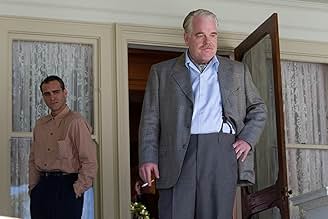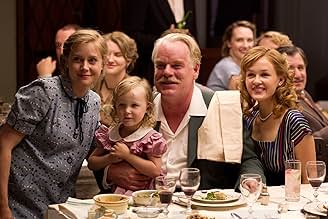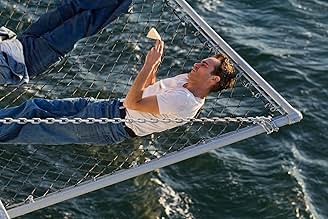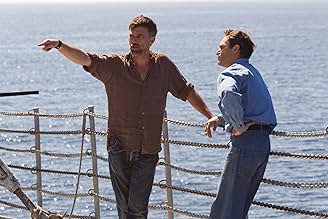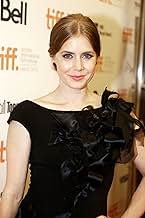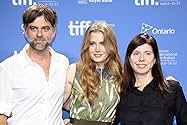Un ancien combattant de la marine rentre chez lui après la guerre, inquiet et incertain de son avenir jusqu'à ce qu'il se laisse tenter par un mouvement appelé la Cause et son chef charismat... Tout lireUn ancien combattant de la marine rentre chez lui après la guerre, inquiet et incertain de son avenir jusqu'à ce qu'il se laisse tenter par un mouvement appelé la Cause et son chef charismatique.Un ancien combattant de la marine rentre chez lui après la guerre, inquiet et incertain de son avenir jusqu'à ce qu'il se laisse tenter par un mouvement appelé la Cause et son chef charismatique.
- Director
- Writer
- Stars
- Nommé pour 3 oscars
- 75 victoires et 187 nominations au total
- V.A. Patient
- (as Patrick Biggs)
Avis en vedette
Amy Adams does so much with so little screen time; I do wish we got more time with her but I think her lack of presence contributes to the messaging of the film. She gives an extremely pulled back/subtle performance of a woman that is truly in the middle of the storm.
This feels fresh and distinct from any other movie I've watched, so I'd definitely recommend it.
The film is about the obsession of cult groups which try to answer life's riddles for troubled people. In this case, the group and its leader appear very loosely inspired by Scientology and L. Ron Hubbard, called "the Cause" whose leader is Lancaster Dodd (Hoffman). Although Hoffman plays the title role, the story is really about an ex-naval officer Freddie Quell (Phoenix) who is suffering from PTSD as a result of his involvement in World War II. After the war, he is a lost soul roaming through life with a series of misadventures, such as attacking a customer when he works for a department store as a photographer, or accidentally offering a poisonous drink to a migrant worker.
At his lowest point, he wakes up on board some kind of small yacht and meets a strange man, Lancaster Dodd, who informs him he's aboard his ship at Quell's request, although our protagonist can't remember having boarded. Quell learns about Dodd at their first meeting who states "I am a writer, a doctor, a nuclear physicist and a theoretical philosopher, but above all, I am a man, a hopelessly inquisitive man, just like you." He also says people attack him for his "dangerous" ideas. Slowly, Quell learns that Dodd is head of some kind of an underground movement combining philosophy and pseudo-science and publishes books on some far-fetched ideas which probably have no scientific basis. Dodd is often referred to as simply "Master" by members of this group. Dodd and his group believe the way to "heal" troubled people is by cleansing their souls through a hypnotic process which attempts to heal injuries inflicted during past lives.
Probably the most compelling part of the film is the first half, where we as the audience learn about Dodd and the Cause through the eyes of Quell. The most captivating moment is when Dodd is accused of not only illegally accepting a large donation from a philanthropist through a foundation, but practicing medicine without a license. I thought the film would focus on these accusations, but then the film leaves these indictments far behind. Afterwards, the film meanders, a bit like Quell at the beginning. The film becomes an episodic montage of interesting moments which are rather disconnected. By film's end, I didn't feel much more was revealed about Dodd and his Cause than when Quell first joined during the first third of the film.
Although all the acting is right on the money including outstanding performances by Hoffman and Phoenix, and the script dialog was absolutely true the characters, the entire film was kind of dissatisfying. We as the audience are given hints of the politics of Dodd and his inner circle but often these ideas are never fully developed. Also, much screen time was devoted to many of the "past life" sessions conducted by Dodd, but I think at some point it became wasted screen time. After 3 or 4 sessions, I pretty much understood the idea but instead countless others are offered without giving much insight into Dodd and who he is. By film's end, "The Master" was more like a character study than a story. A noble effort that wasn't quite there for me.
What else it lost was any direction and sense of momentum that it may have had up till that point. The story doesn't go anywhere and it takes its time doing it, meandering through similar ground and offering nothing to really justify the long running time. Some may chose to see this as people complaining about a lack of action etc (again, that snobby of assuming such comments must mean "I need a car chase") but this isn't it at all; the story-telling seems to fall way down a priority list and it is a real shame because so much else about the film is excellent.
The first thing that grabs you is visually how stunning the film is – and it is a factor that remains consistent across the whole film. The colors, the framing and the size of the images are alluring and engaging. I had not heard of Malaimare before seeing his name in the credits, but his work here is terrific. On top of these images we get great use of music that is like a bedding rather than being stuck on top. It is hard to describe but it works very well, spilling under scene after scene and giving the delivery an oddly engaging feel and tone. As everyone has already said, the film is carried with some very strong performances. Phoenix is really great, with ragged edges and internals on display. Hoffman is more patient but also prone to rage when questioned and he balances this well. Adams surprised me the most as I think I didn't expect her to be as good as she was. The three of them (but mostly the lead two) make the film much better by virtue of what they do – and it is just a shame that the story-telling isn't better for them.
Indeed this is true for me of everything, because the film is so well made, looks so beautiful and is a great piece of crafting that it really is such a shame to be left cold by it and to feel it meandering without any momentum or reason. It is a great film and it deserves to be seen for what it does so very well, but in no way is it a good story – and it is this aspect that really lets it down.
Phoenix's performance as Freddie reduces all he's done before to a preparation exercise. He longs for something, but even he can't tell you what, and that sorrow has clotted into self- destructive ritual. We see his snarly face from angles we haven't seen before. We're not sure if his leery eyes are hateful or if he's dead inside. He's a captivating animal.
Then he meets stout, articulate Lancaster Dodd, always circled by people who treat him like a prodigy, hanging on his every word, laughing at all his mugging. Lancaster fancies himself a renaissance man. He's married to Peggy, who's much more vigilant than we first think. His son trails the proceedings with a dormant pose of derision. His daughter marries a man who, like everyone else in their clique, views him as a wizard.
The film belongs to Phoenix, but Hoffman more than does his thing, his affectations ringing with conceit and fraudulence. Freddie---father dead, mother institutionalized---is naturally drawn to Dodd, who promises answers, mental freedom, happiness, even claims to cure leukemia. He's written a book his bootlickers treat as a sort of bible. He loves to charm and perform.
It's well-known that Lancaster's cult is inspired by L. Ron Hubbard's Scientology. It's not direct, but the manner in which Lancaster draws Freddie into the fold, among other things, is unmistakably influenced by the contentious institution and Hubbard's life. Paul Thomas Anderson doesn't bind to that inspiration for his movie...but he doesn't bind to anything, really. You walk out muddled, wearied, wondering where to start in connecting the dots in this elegant, arresting movie. The story is as confounding as its technique is magnificent.
Anderson, the true wunderkind of the Tarantino generation, sets everything up so beautifully, you wait for the turning point to prevail so the intrigue can come to boil. Instead, nothing progresses. The dramatic developments seem to dwindle and become less consistent as the movie drifts along, and Anderson throws in pauses, like a lingering desert scene or an outstretched montage in which Freddie is made to pace in a room, that slow the movie to a drudge. Freddie's sex preoccupation, which was stressed in the film's early stretch, grows dissonant. It's less about narrative arc and more the emotional condition of two men, a twist of trust and mistrust, id and superego. PTA's vision is grand in scope, but his result is not so much ambiguous as opaque and detached.
For the first time in his immaculate career, the greatest filmmaker of his generation seems to languish. His newfound frigidness makes the film easy to admire but difficult to love. Anderson is so stunningly impressive, in fact, that it's taken me two viewings of The Master to admit all this to myself. Understandably, some critics have patronized it as deliberately evasive and occult, but isn't that just double-talk? A glorification of an artist's failure to proportionately bear his ideas? Something particularly intriguing is how the movie poses questions not so much about the importance of faith, but how far the human limit for change can extend and to confront emotional devastation so heavy it can never recover. But the film is too ambivalent or cautious to probe them in depth. By the end, it's become an opaque challenge between two phenomenal actors whose commitment to their roles is awe-inspiring, but it's manacled to a work so in awe of itself, the audience gets blockaded.
Inspired by Scientology founder L. Ron Hubbard and the development of a cult, 'The Master' is a drama-piece through and through.
The movie doesn't have a message or goal as such and sort of does it's own thing.
The things worth watching are the terrific performances, weird content and some very fine cinematography.
Le saviez-vous
- AnecdotesDuring the jail cell scene, Joaquin Phoenix breaks a real toilet. His actions were entirely improvised. Due to the historical past of the building where the scene took place, the toilet was considered "historical." Joaquin had no intentions to break the toilet, nor did he think it was possible.
- GaffesIn the "pacing" scene, as Quell goes from wooden paneled wall to window and back, the second time he goes to he wooden paneling, he breaks out a panel when he pounds it with rage. In the numerous successive shots, the wood panel is restored.
- Citations
Lancaster Dodd: If you figure a way to live without serving a master, any master, then let the rest of us know, will you? For you'd be the first person in the history of the world.
- Générique farfeluAfter its title, this film has no further opening credits.
- ConnexionsEdited into Conspiracy: The Hollywood Syndicate (2015)
- Bandes originalesBaton Sparks
From '48 Reponses to Polymorphia'
Written by Jonny Greenwood
Performed by The Aukso Chamber Orchestra
Courtesy of Unreliable Ltd.
Meilleurs choix
Détails
- Date de sortie
- Pays d’origine
- Langues
- Aussi connu sous le nom de
- The Master
- Lieux de tournage
- Mare Island, Vallejo, Californie, États-Unis(as Philadelphia, Pennsylvania and various houses, a park and the docks)
- sociétés de production
- Consultez plus de crédits d'entreprise sur IMDbPro
Box-office
- Budget
- 32 000 000 $ US (estimation)
- Brut – États-Unis et Canada
- 16 377 274 $ US
- Fin de semaine d'ouverture – États-Unis et Canada
- 736 311 $ US
- 16 sept. 2012
- Brut – à l'échelle mondiale
- 28 689 359 $ US
- Durée
- 2h 18m(138 min)
- Couleur
- Mixage
- Rapport de forme
- 1.85 : 1







